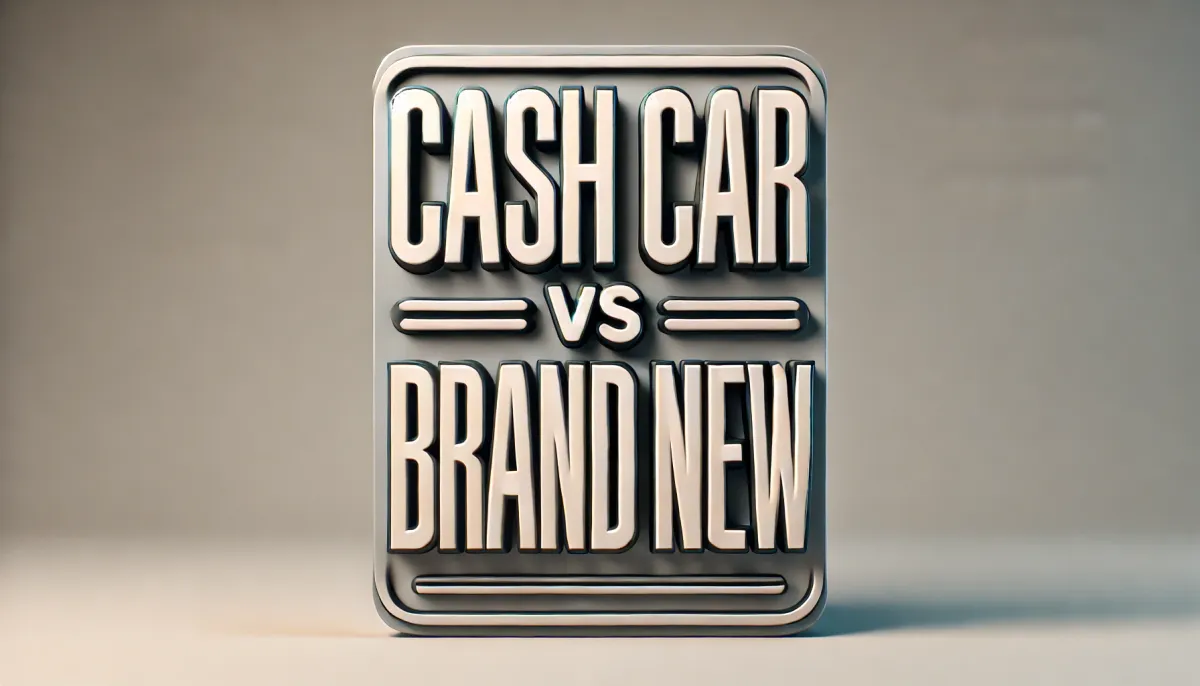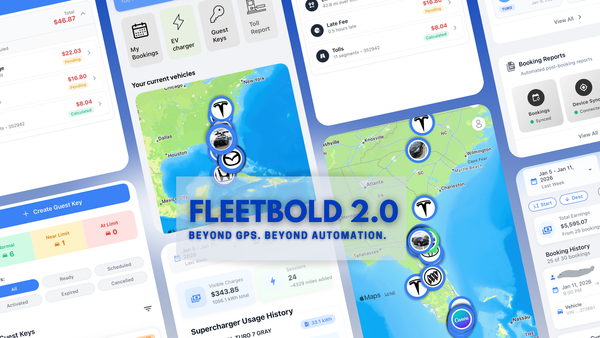Cash Cars or Brand New: What’s Better for Turo Hosts in 2025?
Thinking about putting your car on Turo? This blog explores the real pros and cons of using a cash car versus a brand new vehicle, including the impact of recalls, income potential, and risk exposure.

Why the Choice Between Cash Cars and Brand New Vehicles Matters
Turo has become an exciting way for car owners to generate passive income by renting out their vehicles. In fact, the number of Turo hosts has increased steadily in recent years as more people seek flexible alternatives to traditional car rental companies. However, one of the major decisions you will face as a Turo host is whether to invest in cash cars (used vehicles) or brand new cars for your fleet.
In 2025, the decision between purchasing a used vehicle versus a new car is more important than ever. With fluctuating car prices, changing market demands, and evolving customer preferences, understanding the pros and cons of both options is critical to your success as a Turo host.
Understanding Turo’s Vehicle Requirements and the Rental Market in 2025
Turo’s Vehicle Requirements
Before you even start considering which type of vehicle to purchase, it's important to understand Turo's basic vehicle requirements. Turo allows a wide variety of cars to be listed on its platform, but each vehicle must meet certain criteria. These include:
- Age of the Vehicle: Turo typically accepts cars that are no older than 12 years (with some exceptions). This means you need to make sure that your used cars fit within this guideline.
- Condition: Turo has strict guidelines for vehicle condition. Your car must be well maintained, both mechanically and aesthetically, to be listed on the platform.
- Mileage: While Turo does not have a strict mileage limit, high mileage vehicles may be less appealing to renters. Cars with less than 100,000 miles tend to attract higher demand.
As a host, meeting these requirements is critical. Whether you choose to buy a cash car or a brand new vehicle, understanding these criteria ensures that your car is eligible to be listed on the platform.
The Changing Turo Market in 2025
Turo is constantly evolving. In 2025, hosts are facing a more competitive market than ever before. This is partly due to the growing number of new hosts joining the platform and the increasing diversity of rental options available to customers. Renters are now looking for more than just transportation—they want experiences. Many customers are seeking vehicles that offer:
- Luxury and premium features
- Fuel efficiency and eco friendliness
- Modern tech (e.g., Bluetooth, backup cameras, etc.)
- Safety features (e.g., lane assist, emergency braking)
Understanding the demands of the Turo market will help you decide whether cash cars or brand new cars are more likely to meet the needs of your potential customers.
The Pros and Cons of Cash Cars
Cash cars refer to used vehicles that are bought outright for a lower price than brand new models. These cars can be a great way to enter the Turo market without breaking the bank, but they come with their own set of benefits and challenges. Let’s dive into the pros and cons of choosing cash cars for your Turo fleet.
Pros of Cash Cars
- Lower Initial Investment One of the biggest advantages of cash cars is the lower upfront cost. Used vehicles are significantly cheaper than brand new cars, which means you can purchase multiple vehicles with the same budget. The lower purchase price means you won’t be tied to large car loans or monthly payments, which can be especially beneficial for new Turo hosts who are just starting out.
- Faster Return on Investment (ROI) With a lower initial investment, you can start earning revenue more quickly. Cash cars typically offer a faster ROI, as they require less capital to acquire and start generating income almost immediately. If you’re renting out an older but reliable car, it could start paying for itself within a few months.
- Less Depreciation Brand new cars lose value rapidly, with many cars losing up to 20% of their value in the first year alone. Cash cars, on the other hand, have already gone through their biggest depreciation period. When you purchase a used vehicle, it has already lost much of its value, so you won’t experience the same level of depreciation as you would with a brand new car.
- Insurance Savings Insurance premiums for used cars tend to be lower than for new vehicles. This can be a significant cost savings over time, especially if you're managing a fleet of vehicles. Although you will still need to cover comprehensive insurance for your Turo cars, choosing older models can help reduce your overall costs.
Cons of Cash Cars
- Higher Maintenance Costs Older cars require more maintenance, which can result in higher long term costs. While a cash car may not need repairs immediately, it will likely need more frequent servicing as it ages. This could eat into your profits, especially if the car is used often.
- Limited Features Cash cars generally don’t come with the modern features that customers expect. Features like touchscreen infotainment systems, lane assist, adaptive cruise control, and other high tech features are common in new vehicles but may be absent from older models. This could affect the appeal of your fleet and make it harder to attract customers who are looking for a premium experience.
- Unpredictability Used cars come with an element of unpredictability. Even if a used car has been well maintained, there is still the potential for mechanical failure, especially if the car has high mileage. If your car breaks down while a customer is renting it, you could face unhappy customers and negative reviews, which could hurt your ratings on Turo.
The Pros and Cons of Brand New Vehicles
Brand new vehicles are shiny, feature packed, and appealing to many Turo renters. While they come with higher upfront costs, many hosts find that investing in a new car can provide a better customer experience and lower maintenance costs over time. Let's explore the pros and cons of purchasing brand new cars for your Turo fleet.
Pros of Brand New Vehicles
- Higher Customer Appeal New cars are highly attractive to renters who are looking for a premium experience. They are generally more reliable, feature packed, and luxurious, which makes them appealing to customers who want a more upscale experience. Additionally, new cars tend to have better gas mileage and are more eco friendly, which can be an attractive feature for environmentally conscious renters.
- Lower Maintenance Costs One of the most significant advantages of brand new vehicles is that they are more reliable and require less maintenance in the first few years. When you purchase a new car, you don’t have to worry about unexpected repairs or breakdowns. This can save you money on maintenance and minimize the risk of having to take a vehicle off the platform due to mechanical issues.
- Warranty Coverage New cars come with manufacturer warranties that protect against mechanical failures. If your car experiences any issues, the warranty will typically cover the cost of repairs, reducing the financial impact on your business. This peace of mind is an attractive feature for hosts who want to minimize risk.
- Modern Features New cars come equipped with the latest technology and features, including advanced safety systems (e.g., lane assist, emergency braking), Bluetooth connectivity, GPS systems, and modern infotainment options. These features not only make the car more attractive to renters but also enhance the rental experience, increasing the likelihood of positive reviews.
Cons of Brand New Vehicles
- Higher Initial Investment The most obvious drawback of purchasing brand new cars is the high initial cost. New vehicles can be significantly more expensive than used cars, which means you will need to secure financing and commit to larger monthly payments. This upfront investment can take a while to recover, which may not be ideal for new Turo hosts with limited capital.
- Depreciation New cars lose value quickly. In the first year alone, many new cars can lose up to 20% of their value, and this depreciation continues throughout the vehicle’s life. If you plan to sell your car after a few years, you might not get as much money for it as you would have hoped.
- Higher Insurance Costs Insurance premiums for new cars tend to be higher than for used cars. This means that while you may be saving on maintenance, you will need to factor in the increased insurance costs when pricing your rentals.
Factors to Consider When Choosing Between Cash Cars and Brand New Vehicles
Choosing between cash cars and brand new vehicles for your Turo fleet depends on several key factors, including your budget, customer demand, and long term goals. Here are the main factors to consider when making your decision:
1. Budget and Financing
If you have a limited budget, cash cars are likely the better option. They require a smaller upfront investment, allowing you to purchase multiple cars and start earning income quickly. However, if you have access to financing and can manage higher monthly payments, a brand new car might be a better option for long term growth.
2. Customer Demand
Understanding the types of cars that customers in your area prefer is essential. If you're operating in a high demand market for luxury or newer cars, investing in a brand new vehicle may help you attract more renters. On the other hand, if you’re serving a budget conscious market, cash cars might be more appealing.
3. Maintenance and Longevity
Brand new cars require less maintenance in the first few years and tend to have a longer lifespan. While cash cars are cheaper, they will require more frequent repairs and may have a shorter lifespan, leading to potential downtime.
4. Business Strategy
Your business strategy will play a key role in your decision. If you plan to offer affordable vehicles for short term rentals, cash cars may fit your strategy. If you're looking to provide a premium experience and attract high end customers, investing in new vehicles could be the right choice.
Conclusion: Which Is Better for Turo Hosts in 2025?
In 2025, there’s no one size fits all answer to the question of whether cash cars or brand new vehicles are the better choice for Turo hosts. It all depends on your goals, budget, and market conditions.
If you’re on a budget or want to build a large fleet quickly, cash cars might be the better choice. They offer a lower initial investment and faster ROI. However, if you're looking to provide a premium experience, attract more customers, and minimize maintenance costs, investing in brand new vehicles could be a more profitable long term strategy.
By carefully considering these factors, you can make a decision that aligns with your business goals and ensures a successful Turo hosting experience.
Frequently Asked Questions (FAQ)
1. What’s the difference between cash cars and brand new vehicles for Turo hosts?
Cash cars are used vehicles bought outright for a lower price, while brand new cars come with higher costs but offer modern features and better reliability.
2. Are cash cars profitable for Turo hosts?
Yes, cash cars can be profitable, especially if you maintain them well. They offer a quicker return on investment, but you’ll need to factor in higher maintenance costs.
3. How do I know which type of car to buy for my Turo fleet?
It depends on your budget and business strategy. If you're starting small and need to minimize costs, cash cars are a good choice. For premium experiences and higher customer appeal, brand new vehicles may be the way to go.
4. Do new cars attract more customers on Turo?
Yes, new cars tend to attract customers looking for a premium experience with modern features and higher reliability.
5. What are the maintenance costs for cash cars on Turo?
Maintenance costs for cash cars can be higher because they are older. However, with regular upkeep and proper maintenance, these costs can be managed effectively.





